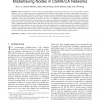Free Online Productivity Tools
i2Speak
i2Symbol
i2OCR
iTex2Img
iWeb2Print
iWeb2Shot
i2Type
iPdf2Split
iPdf2Merge
i2Bopomofo
i2Arabic
i2Style
i2Image
i2PDF
iLatex2Rtf
Sci2ools
149
click to vote
TMC
2012
2012
Modeling and Performance Evaluation of Backoff Misbehaving Nodes in CSMA/CA Networks
—Backoff misbehavior, in which a wireless node deliberately manipulates its backoff time, can induce significant network problems, such as severe unfairness and denial-of-service. Although great progress has been made towards the design of countermeasures to backoff misbehavior, little attention has been focused on quantifying the gain of backoff misbehaviors. In this paper, to assess the gain that misbehaving nodes can obtain, we define and study two general classes of backoff misbehavior: continuous misbehavior, which keeps manipulating the backoff time unless it is disabled by countermeasures, and intermittent misbehavior, which tends to evade the detection of countermeasures by performing misbehavior sporadically. Our approach is to introduce a new performance metric, namely order gain, to characterize the performance benefits of misbehaving nodes in comparison to legitimate nodes in CSMA/CA-based wireless networks. We derive the order gains of both continuous and intermittent...
Related Content
| Added | 29 Sep 2012 |
| Updated | 29 Sep 2012 |
| Type | Journal |
| Year | 2012 |
| Where | TMC |
| Authors | Zhuo Lu, Wenye Wang, Cliff Wang |
Comments (0)

